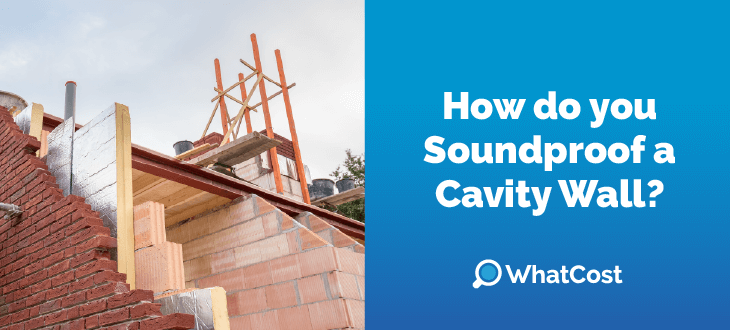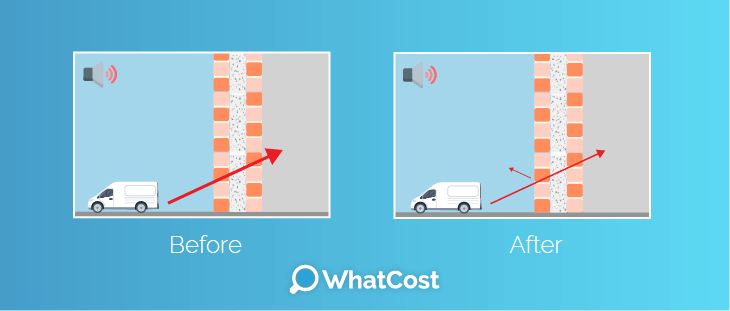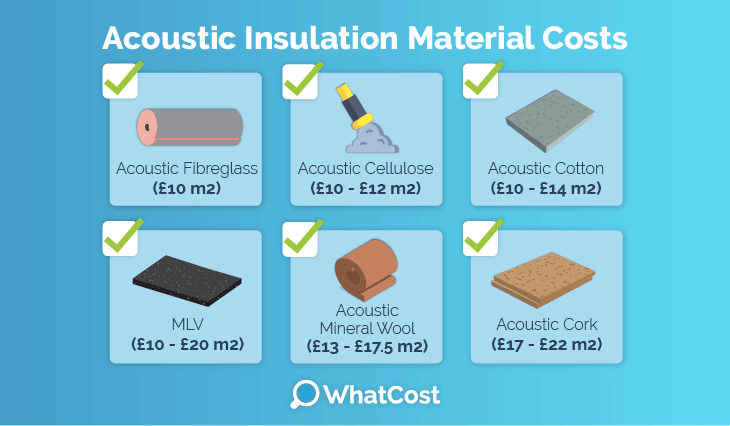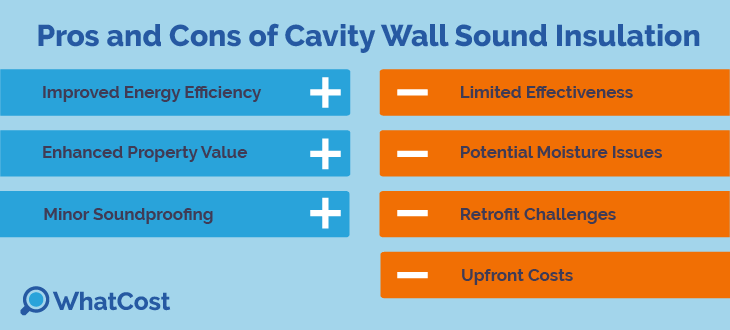Answer these simple questions and we will find you the BEST prices
Which type of solar quotes do you need?
It only takes 30 seconds
100% free with no obligation

Tell us what you need to find a matching specialist

Get free quotes from professionals near you

Compare offers and choose the one that best matches your need
- whatcost.co.uk
- Home Insulation
- Wall Insulation
- Cavity Wall Insulation
- Cavity Wall Insulation Soundproofing
Cavity Wall Insulation Soundproofing: How Does It Work?


- Cavity wall insulation, injected in the cavity space between the inner and outer wall leaves reduces heat loss while also offering some, but variable, noise reduction.
- By absorbing and blocking sound waves, cavity wall insulation can enhance the acoustic privacy of your home, making it a more comfortable and relaxing space.
- Average costs for a retrofit cavity wall insulation are around £1,000 to £4,600 depending on your home type, size, and installation.
Living near busy roads, railways, or noisy neighbours can significantly impact your quality of life. Wall cavity insulation, primarily known for its energy-saving benefits, can also offer some degree of soundproofing in these circumstances.
Filling the air gap between the inner and outer leaves of a cavity wall with insulating material can help reduce sound transmission. While cavity wall insulation is not a miracle cure for noise problems, its effectiveness as a soundproofing measure can be maximised to provide a decent degree of comfort.
This complete guide by WhatCost will delve into soundproofing cavity walls, exploring potential benefits and limitations, how it works, and associated costs. We will also discuss the importance of professional assessment to determine if this solution is suitable for your home.
Ready to soundproof your cavity walls? WhatCost can land you the bargains! Instead of spending countless hours surfing the web and scheduling phone calls, spend just 30 seconds filling out our online form and receive up to 3 free home-tailored quotes from professionals in your area. No costs, no obligations. Simply click below to begin!
How does cavity wall insulation soundproofing work?

While designed to reduce heat loss, the installation of cavity wall insulation can also offer some degree of soundproofing. This is achieved by filling the air gap between the outer and inner walls with insulating material, which helps to dampen sound transmission and reduces echo.
How cavity wall insulation can provide some degree of soundproofing is by:
- Absorbing sound: The installed insulation material within the cavity acts as a sound absorber, reducing the amount of sound energy that can pass through the wall.
- Disrupting sound waves: The presence of the insulating material within the cavity disrupts the direct transmission of sound waves, scattering and absorbing them.
However, it's important to stress that soundproofing is not the primary goal of cavity wall insulation, which is designed for heat retention. As such, cavity wall insulation won't bring significant improvements to noise reduction, especially in noticeably loud environments.
For substantial improvements, specialised acoustic insulation materials and techniques may be necessary. These involve internal wall insulation measures using special design sound insulation materials such as acoustic cotton or mass-loaded vinyl (MLV).
How much does cavity wall sound insulation cost?

On average, a full cavity wall insulation job costs around £1,000 to £4,600 depending on factors such as your home type, size, chosen materials and installation complexity. However, as mentioned, cavity wall insulation alone will not provide sufficient soundproofing.
Luckily, certain materials are designed for superior sound insulation, often installed as internal wall measures. Here’s a breakdown of the average cost of cavity wall insulation per m2 for soundproofing material:
| Soundproof insulation | Average cost (£/m2) |
|---|---|
| Acoustic fibreglass | £10 |
| Acoustic cellulose | £10 - £12 |
| Acoustic cotton | £10 - £14 |
| Mass-loaded vinyl (MLV) | £10 - £20 |
| Acoustic mineral wool | £13 - £17.5 |
| Acoustic cork | £17 - £22 |
It’s good to keep in mind that your final costs may vary depending on your home type, wall conditions, material availability and many other factors. For example, the best cavity wall insulation for new build properties will differ from best cavity wall insulation for old house circumstances.
Consulting with a professional installer can help you get the best idea of what to expect as an investment.
Pros & cons of cavity wall sound insulation

While primarily designed for energy efficiency, cavity wall insulation can offer some degree of soundproofing. However, it's crucial to understand that its soundproofing capabilities are limited compared to dedicated soundproofing measures.
Here’s a breakdown of the key benefits and limitations of cavity wall insulation in terms of soundproofing performance:
- Improved energy efficiency: Proper cavity wall insulation significantly reduces home heat loss by up to one-third. For a detached UK home, this can result in lower energy bills of up to £410 and a slashed carbon footprint of 1.1 tonnes annually.
- Enhanced property value: Homes with a higher EPC rating are valued much higher on the housing market due to energy security and comfort. Cavity wall insulation means a better return on investment should you ever rent or sell your home.
- Minor soundproofing: While not designed for soundproofing, cavity wall insulation can slightly reduce the transmission of some airborne sounds, especially those of higher frequencies.
- Limited effectiveness: Cavity wall insulation alone is not a significant soundproofing solution. It primarily addresses high-frequency sounds, while low-frequency sounds ( such as traffic or construction) will still be very noticeable.
- Potential moisture issues: Improper cavity wall installation can trap and leech moisture, leading to mould growth and potential structural damage to your home. This can be avoided by accounting for ventilation.
- Retrofit Challenges: Installing insulation in existing buildings can be more complex and disruptive than in new constructions. There are often outdated repairs and debris that need to be addressed before an installation can take place.
- Upfront costs: The initial investment for high-grade cavity wall insulation materials and a professional installation can be substantial. However, grant programs like the Great British Insulation Scheme (GBIS) and Energy Company Obligation (ECO4) are designed to help low-income homes front the bill.
While cavity wall insulation offers some soundproofing benefits, it's crucial to manage expectations. For significant soundproofing, consider consulting with a professional installation installer to explore more effective and targeted solutions.
Don’t want to waste endless hours researching and vetting? WhatCost can help you. All it takes is 30 seconds to fill out our simple online form. In return, we will send you 3 free home-tailored quotes from our network of pre-vetted professionals. Just click below to begin!
How effective is cavity wall insulation for soundproofing?
Cavity wall insulation provides a dual benefit: improved energy efficiency and a moderate degree of soundproofing. By creating an additional barrier within the wall structure, cavity wall insulation absorbs vibrations and reduces the transmission of airborne sound. While not a complete solution, cavity wall insulation can significantly enhance a home's acoustic comfort.
The British Board of Agrément (BBA) provides sound insulation ratings for various wall constructions. Here are some examples:
- Lightweight aggregate block walls: A 75mm cavity and dry-lined finish can achieve sound insulation of 54 - 60 dB. This level of sound reduction can diminish common household noises like conversations, television, and even some moderate traffic.
- Dense aggregate concrete block walls: Similar to lightweight aggregate block walls, these can also achieve 54 - 60 dB with a 50mm cavity and dry-lined finish. This can help reduce the impact of moderate traffic, construction site sounds, and even loud music.
- Autoclaved aerated concrete walls: With 100mm blocks and a 75mm cavity, these walls can also achieve 54 - 60 dB. This level of soundproofing can help to reduce the impact of moderate traffic noise, construction site sounds, and even louder music.
Nevertheless, several factors influence the effectiveness of cavity wall insulation and its soundproofing capabilities. Here are just some of the key points to keep in mind:
- Insulation material: Different materials come with different properties. Blanket-based insulation like mineral wool may improve your soundproofing, whilst spray foam might even enhance sound travel due to its open-cell nature, thus promoting echoes.
- Cavity width: The width of the cavity space can significantly impact sound transmission, especially in the absence of any insulation material.
- Wall construction: The proper design, integrity and installation of your cavity walls are crucial for optimal soundproofing performance. Work with a professional to ensure this.
All in all, cavity wall insulation offers a valuable contribution to soundproofing, mainly when concerning mid to high-frequency sounds. While it may not eliminate all noise, it can significantly enhance a home's acoustic comfort and create a quieter living environment.
Is cavity wall sound insulation worth it?
Cavity wall insulation can slightly improve sound insulation in homes, particularly if your cavity walls are hollow. Here is a summary of the key considerations regarding cavity wall insulation and its effects on soundproofing:
- Sound reduction: While ordinary thermal insulation is designed for heat retention, it may still achieve sound insulation ratings of 54 to 60 decibels, mildly reducing the transmission of airborne noise.
- Material and installation: The effectiveness of soundproofing hinges on factors such as wall conditions, chosen insulation material, cavity width, and installation techniques.
While cavity wall insulation can reduce airborne sound to some degree, it won’t eliminate noise issues, especially those involving low-frequency sounds. For more substantial noise reduction, specialised acoustic insulation materials and techniques are recommended.
How long does cavity wall insulation last? Thankfully, a very long time if installed correctly. Most cavity wall insulation materials are expected to outlast 25+ years, with some reports claiming up to 100 years. Either way, it’s vital to get your cavity insulation checked every 25 years or so to ensure it is healthy and functional.
How to check cavity wall insulation? Contact a professional installer to conduct a housing assessment.
Working with a qualified and reputable installer can help tailor the best approach, but finding the right fit is time-consuming, requiring extensive research and comparisons. That was until WhatCost came along!
With our services, all you need is 30 seconds to fill out our online form, and in turn, we’ll send you 3 free home-tailored quotes from our nationwide network of professionals. The best part? Our services are completely free of charges and obligations. Simply click below to begin and let the bargains come to you!
FAQ
While cavity wall insulation is not designed for soundproofing, certain materials may provide some degree of acoustic insulation. For effective soundproofing, there are materials specifically designed for the purpose, such as acoustic cotton and mass-loaded vinyl (MLV).
To soundproof a wall cavity, install insulation materials that provide minor soundproofing. For example, blanket-based insulators like mineral wool may reduce some airborne sound, whereas spray foam may even do the opposite and enhance sound transfer.
Blonde mineral wool or other blanket-style insulators are most likely the best cavity wall insulation for soundproofing because they can minimally absorb sound. On the other hand, open-cell spray foam is one of the worst materials because it enhances echoes.
The best method of soundproofing a wall that’s already built is through internal or external insulation measures. By installing specialised acoustic insulation materials onto an existing wall, you can drastically reduce sound transfer.

Akif has a keen interest in green home improvement solutions and the role of digital media in identifying climate trends. He aims to provide a multidisciplinary approach to content rooted in credible research and accuracy.
